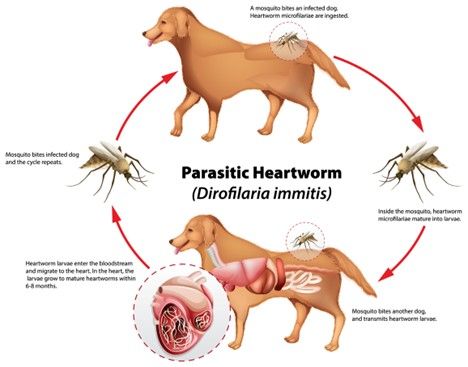

What is Heartworm Disease?
Heartworm disease is an infectious parasitic disease caused by worms living in the blood vessels of the heart and lungs of an animal. These worms reproduce and grow over time, seriously damaging the heart and other major organs. Infection most commonly affects dogs, but cats can get heartworm too. Left untreated, it results in death in pets.
What is Heartworm Disease?

Symptoms in Cats
• Difficulty or labored breathing
• Vomiting
• Decreased activity
• Loss of appetite
• Weight loss
• Convulsions.
• Blindness.
• Fluid in the lungs.
Symptoms in a Dog
• Mild persistent cough
• Reluctance to exercise
• Fatigue after moderate activity
• Decreased appetite
• Weight loss
Diagnosing Heartworm Disease in Pets.
To diagnose heartworm disease in your pet, we typically use a series of tests to determine the presence of adult heartworms or larvae. We use an antigen test to detect the presence of proteins released by adult female heartworms. We can also perform an antibody test to check for antibodies created by your pet's immune system in response to an infected mosquito bite. We use chest X-rays to visualize a pet's heart and lung tissue. If any of these tests detect the presence of heartworms, we may recommend additional tests to assess the severity of the infection.
Treating Heartworm Disease in Pets.
When treating heartworm disease, we consider your pet's species, age, size, and overall health before treatment. Generally, standard treatments for dogs involve giving a series of closely monitored injections or administering oral medication over a short period. Depending on the severity of the infestation and your pet's risk factors for developing complications, we may recommend additional testing to monitor the treatment. Dogs who are affected with heartworm disease will require treatment in order to get rid of the parasites and restore health. Treatment usually consists of drugs administered orally or through injection, depending on the severity of the condition.
Cats are not natural hosts for heartworm but they can get them, especially if they are around another pet, such as a dog, infected with heartworms. Cats with adult heartworms typically have just one to three worms, and many cats affected by heartworms have no adult worms. While this means heartworm disease often goes undiagnosed in cats, it’s important to understand that even immature worms cause damage to the cat’s respiratory system. Moreover, the medication used to treat heartworm infections in dogs cannot be used in cats, so prevention is the only means of protecting cats from the effects of heartworm disease. You can read more about heartworm disease in cats from the American Heartworm Society’s article: Heartworm in Cats.
Managing Post-Infection Symptoms.
After treatment, your pet will need close monitoring to minimize the risk of further complications. Symptoms such as weight loss, weakness, and lethargy may accompany heartworm infection initially. These may persist for several weeks or months after treatment due to the inflammation and damage caused by the worms in your pet's body. Depending on the length and severity of the infection, additional treatments may be necessary to ensure continued health post-infection. Regular checkups with your veterinarian are essential in identifying any potential risks.
Heartworm Prevention
Prevention is the best protection against heartworm disease in your dog or cat. Year-round preventive medications can help protect your pet from becoming infected with heartworms.
Bring your pet to Oak Creek Animal Clinic for regular checkups, where we can run heartworm tests on your pet to detect any early signs of infection.
You can also reduce the risk of infection by avoiding areas infected with mosquitoes.
- Temporary pools and ponds created by melting snow or rain.
- Floodplains along streams and riverbanks.
- Irrigated fields and meadows.
- Containers that hold water and fill up after a rain shower.
- Tree holes that collect rainwater.
Take Advantage of Our Specials for Heartworm Awareness Month!
In recognition of Heartworm Awareness Month, we are offering specials to help pet parents protect their pets from heartworm disease. We are offering a free heartworm test with the purchase of a year’s supply of heartworm prevention per pet! Plus, you can get additional savings with a coupon available at the clinic!
Now is the time to protect your pet from heartworm disease before the mosquito season hits in full force. Please contact us to schedule an exam and preventative treatment.
Your Friendly Team at
Oak Creek Small Animal Clinic


